高级英语lesson2原文及其翻译
- 格式:doc
- 大小:43.02 KB
- 文档页数:9
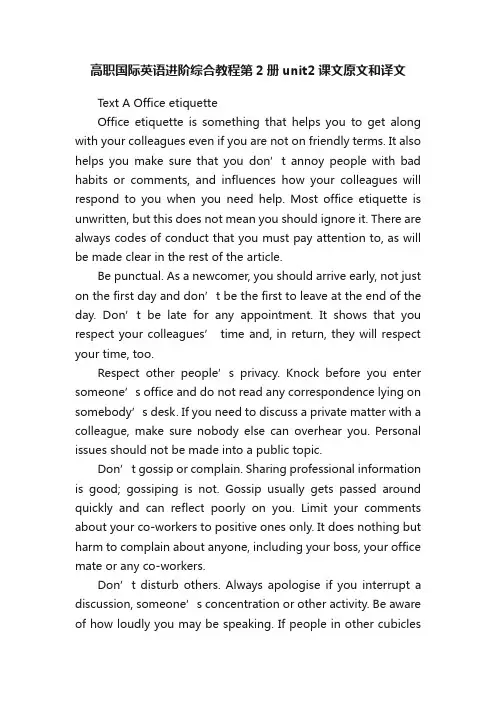
高职国际英语进阶综合教程第2册unit2课文原文和译文Text A Office etiquetteOffice etiquette is something that helps you to get along with your colleagues even if you are not on friendly terms. It also helps you make sure that you don’t annoy people with bad habits or comments, and influences how your colleagues will respond to you when you need help. Most office etiquette is unwritten, but this does not mean you should ignore it. There are always codes of conduct that you must pay attention to, as will be made clear in the rest of the article.Be punctual. As a newcomer, you should arrive early, not just on the first day and don’t be the first to leave at the end of the day. Don’t be late for any appointment. It shows that you respect your colleagues’ time and, in return, they will respect your time, too.Respect other people’s privacy. Knock before you enter someone’s office and do not read any correspondence lying on somebody’s desk. If you need to discuss a private matter with a colleague, make sure nobody else can overhear you. Personal issues should not be made into a public topic.Don’t gossip or complain. Sharing professional information is good; gossiping is not. Gossip usually gets passed around quickly and can reflect poorly on you. Limit your comments about your co-workers to positive ones only. It does nothing but harm to complain about anyone, including your boss, your office mate or any co-workers.Don’t disturb others. Always apologise if you inter rupt a discussion, someone’s concentration or other activity. Be aware of how loudly you may be speaking. If people in other cubiclesor offices comment on your conversations, perhaps your voice is too loud. You should either close your office door or lower your voice.Be neat and clean. Take a shower regularly and wear appropriate office clothes. It shows respect for both your colleagues and clients and is a sign that you are professional. Keep your personal workspace clean and neat at all times, for a mes sy desk will make people think that you’re an unorganised person.Be polite to everyone.Smile a lot and be friendly. Treat your co-workers, cleaners, maintenance people and others with the same respect and politeness. Showappreciation for any help offered to you.Be considerate. Wash and return all kitchen items to their proper place and clean anything you have spilt. If you have used the last drop of milk, either tell the person responsible for supplies or buy a replacement. Leave the photocopier in working condition. Return the stapler that you borrowed with at least a few staples left inside. When you use up all the paper in the printer, put more in it for the next person. If a machine jams, try to undo the jam or to tell somebody about it.In short, office etiquette is about being respectful and polite in the office. It is an essential part of growing professionally and becoming a more mature person in the business world.译文:办公室礼仪办公室礼仪能帮助你与同事和睦相处(哪怕关系未必融洽),让你确保自己不因为坏习惯或不当的言论而惹恼别人,进而影响你的同事在你需要帮助时的反应。
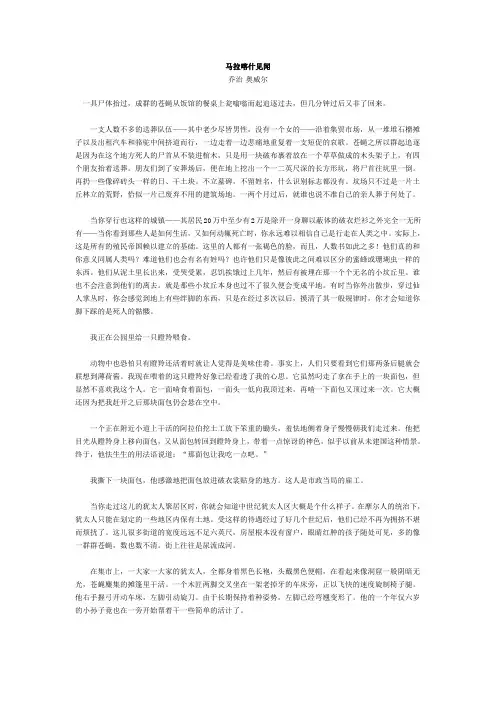
马拉喀什见闻乔治·奥威尔一具尸体抬过,成群的苍蝇从饭馆的餐桌上瓮嗡嗡而起追逐过去,但几分钟过后又非了回来。
一支人数不多的送葬队伍——其中老少尽皆男性,没有一个女的——沿着集贸市场,从一堆堆石榴摊子以及出租汽车和骆驼中间挤道而行,一边走着一边悲痛地重复着一支短促的哀歌。
苍蝇之所以群起追逐是因为在这个地方死人的尸首从不装进棺木,只是用一块破布裹着放在一个草草做成的木头架子上,有四个朋友抬着送葬。
朋友们到了安葬场后,便在地上挖出一个一二英尺深的长方形坑,将尸首往坑里一倒。
再扔一些像碎砖头一样的日、干土块。
不立墓碑,不留姓名,什么识别标志都没有。
坟场只不过是一片土丘林立的荒野,恰似一片已废弃不用的建筑场地。
一两个月过后,就谁也说不准自己的亲人葬于何处了。
当你穿行也这样的城镇——其居民20万中至少有2万是除开一身聊以蔽体的破衣烂衫之外完全一无所有——当你看到那些人是如何生活,又如何动辄死亡时,你永远难以相信自己是行走在人类之中。
实际上,这是所有的殖民帝国赖以建立的基础。
这里的人都有一张褐色的脸,而且,人数书如此之多!他们真的和你意义同属人类吗?难道他们也会有名有姓吗?也许他们只是像彼此之间难以区分的蜜蜂或珊瑚虫一样的东西。
他们从泥土里长出来,受哭受累,忍饥挨饿过上几年,然后有被埋在那一个个无名的小坟丘里。
谁也不会注意到他们的离去。
就是那些小坟丘本身也过不了很久便会变成平地。
有时当你外出散步,穿过仙人掌丛时,你会感觉到地上有些绊脚的东西,只是在经过多次以后,摸清了其一般规律时,你才会知道你脚下踩的是死人的骷髅。
我正在公园里给一只瞪羚喂食。
动物中也恐怕只有瞪羚还活着时就让人觉得是美味佳肴。
事实上,人们只要看到它们那两条后腿就会联想到薄荷酱。
我现在喂着的这只瞪羚好象已经看透了我的心思。
它虽然叼走了拿在手上的一块面包,但显然不喜欢我这个人。
它一面啃食着面包,一面头一低向我顶过来,再啃一下面包又顶过来一次。
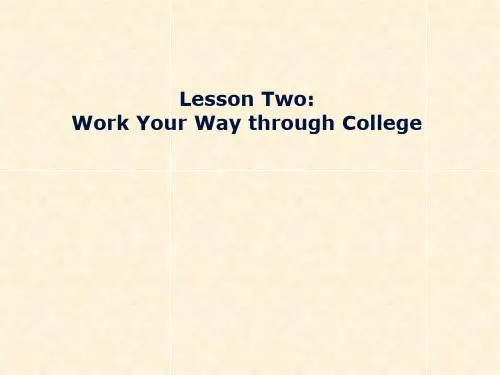
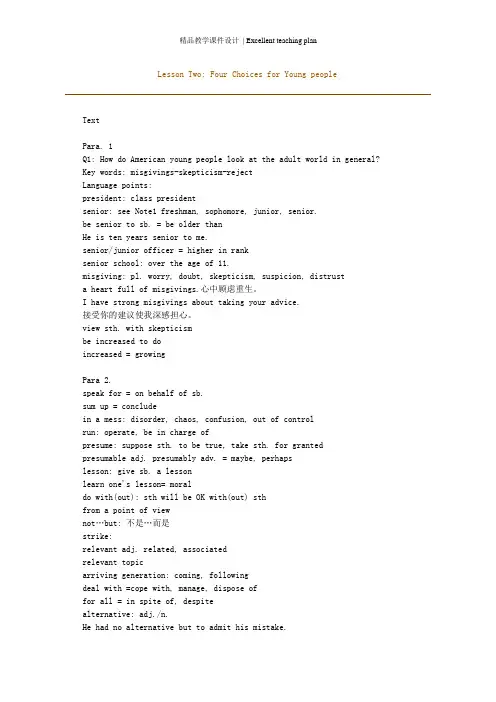
Lesson Two: Four Choices for Young peopleTextPara. 1Q1: How do American young people look at the adult world in general? Key words: misgivings-skepticism-rejectLanguage points:president: class presidentsenior: see Note1 freshman, sophomore, junior, senior.be senior to sb. = be older thanHe is ten years senior to me.senior/junior officer = higher in ranksenior school: over the age of 11.misgiving: pl. worry, doubt, skepticism, suspicion, distrusta heart full of misgivings.心中顾虑重生。
I have strong misgivings about taking your advice.接受你的建议使我深感担心。
view sth. with skepticismbe increased to doincreased = growingPara 2.speak for = on behalf of sb.sum up = concludein a mess: disorder, chaos, confusion, out of controlrun: operate, be in charge ofpresume: suppose sth. to be true, take sth. for grantedpresumable adj. presumably adv. = maybe, perhapslesson: give sb. a lessonlearn one's lesson= moraldo with(out): sth will be OK with(out) sthfrom a point of viewnot…but: 不是…而是strike:relevant adj. related, associatedrelevant topicarriving generation: coming, followingdeal with =cope with, manage, dispose offor all = in spite of, despitealternative: adj./n.He had no alternative but to admit his mistake.One of the alternatives is to resign.drop out: withdraw. See note 11.expedient: meansin one way or anotherbatten on: depend on sth. and benefit from ittake responsibility/shoulder one's responsibilitydistasteful: sick, disgustingundignified: disgraceful, shamefulpoor in spirit: weak in mindleast intolerable: most tolerable or endurableavailable: adj. obtainableQ2: what does "drop out" mean?Why does the author say that the dropouts lead a parasitic way of life?Here, it implies to stop taking part in any social activities.Because they live off the society but do nothing good to it in return.flee = escape, evade=run away frompastoral =bucolicQ3: in what way are those who flee different from the dropouts?They are not parasites. They are willing to support themselves and to contribute sth. to the general community.contribute sth. to (doing) sth. v. offer, devoteto contribute money to a charity causecontribute foreign aid for refugeescontribution n.tension: stress, strainQ4: why is this solution no longer practical on a large scale?Because those quiet, charming and unpolluted landscapes as long enjoyed by ancient hermits are gone forever.on a large/small scalerun out (of)noble savage: see note 17sully v. make sth. dirty, stain, ruin, destroysully one's name, reputation, honorgone: missing, lost, not thereescape from tostream of : main trend, flowIII. plot a revolution: design a strategybe patient withappeal: v./n attract appeal to sb. /sth.dashing and charismatic: energetic, full of drive, courageous, powerful, influential charisma n.smash-clash-crashbuild sth. on the ruinscome off: happen, take place, start; succeedsenescence n. senescent adj. old ageon the barricade: barrierin disillusionmentestablishment: institution, system, organizationoverthrow: throw sth. overhard-faced: harshaccomplish v.-accomplishment n.achieve v.-achievement n.do change : for the purpose of emphasischange sth. for the betterMy point is that-be bound for some placebe bound to do: be destined to do sth.in this case: in this situation, on this condition, under these circumstances dawn n./v.when it dawned, we set off.dawn on sb.The truth began to dawn on him.dream of = conceive ofcleanse v. cleanse sb. of sth.She felt cleansed of all her sins after confession.cleansing cream cleanserworkaday adj. common, ordinaryin need ofsewage disposalunder the labelseek: pursue, go after Q5: what kind of young people tend to follow the strategy of armed revolution?Some of the more active and idealistic young people.Q6: why does the author say that the most unfortunate are those whose revolutions have succeeded?Those idealists who survived the revolution are bound to be disillusioned when they see the newly-established society is as hard-faced as the old one they have just smashed. This is why they are the most unfortunate.IV. one clod: piecemeal, little by little, graduallyat first glancebe far frominviting: adj. appealing, attractiveglamour: charmpromise-promising adj.exasperate v.-exasperating adj.in short supplyremedy one's mistake/losses/the situationavailable: adj. obtainableThis kind of fish can only be available in the deep ocean.suggest: imply, provein a mess: disorder, chaos, turbulencebreak down: crash, go bankruptlikely adj.-possible-probableprotest againstvehemently: strongly, violentlycapture: occupymountain range: 山脉loom: vi. appear threateninglyunprecedented sth.: never happen or been known beforeaffluent: prosperousin guise(disguise)under the guise of friendship: under the cover of sth.population/information/knowledge explosionat the rate/speed/price of:以…比率/速度/价格dwindle: diminishdogged: determinedQ7: what are some of the new problems faced by the young people?Racial justice, pollution, war, population explosionQ8: what is the fourth alternative? Why does the author favor this alternative?Try to change the world gradually.Because it is more practical and a better cure for the world's wickedness than the other three.ExercisesC 7. Though high-sounding, his speech struck everyone at the meeting as totally irrelevant to what was discussed.D 1. The professor looked over our papers with a hasty (sight, glance).glance:扫视 sight:普通的看2. Before ordering their dinner, they considered the (relevant, relative) merits of chicken and roast beef.relative:可作名词,亲戚;adj. 相对的,相比较的relevant:be relevant to 指与…有关的,切题的,强调切题的,切中要害的3. The little boy's constant noise (exhilarated, exasperated) his father, who was busy writing a paper for a symposium.exhilarated:使某人兴奋,高兴exasperated:激怒4. Isn't it (wholesome, noisome) to live in a city with so many vehicles passing day and night?wholesome:健康的,有益的5. He was born in a small town (lived, inhabited) by about 500 people.lived:vi inhabited:vt6. Her desk was all (jumbled, cluttered) with old papers, strings, and other odds and ends.jumble:把东西胡乱地放在一起clutter:胡乱地塞满或覆盖着某物 sth clutter the desk7. He thinks they are extremely (idealistic, ideal), for all their pragmatism.8. She made one last (attraction, appeal) to her father for permission to go to the party.F. 60年代:in the 1960s'充满:be filled with武装革命:armed revolution吸毒:take drugs。

Lesson 2 Breakfast or lunch? 阅读理解 1. Did writer get up early last Sunday? No, he didn’t 2. What was the time? It’s one o’clock.
单词详解 1. until: 一直到;直到…才 e.g. She can’t leave until Friday. 她直到周五才离开。 我们一直走到天黑 We walked until it got dark.
2. outside: adv. 反义词: inside e.g. Please wait outside. 请在外面等。 你可以在房子外停车。You can park your car outside our house. For the same thing, insiders can see the logic inside; for outsiders, they just see the waves on the surface of the lake. 划线词是什么意思?猜猜看对应中文哪句谚语? 内行看门道,外行看热闹。
3. ring: n. 圈,环 e.g. nose ring鼻环/ earring耳环 / diamond ring 钻戒 扩展:ring finger食指/thumb大拇指/index finger食指/long finger中指/ small finger小拇指 v. rang-rung e.g. 如果电话铃响了,你会去接吗?Will you answer the phone if it rings? When I opened the door, the doorbell rang.翻译划线部分:门铃响了 give you a ring= give sb a call
4. aunt 阿姨,姑姑,婶婶,姨妈 uncle 伯伯,叔叔,舅舅 文化:西方亲属词简化。
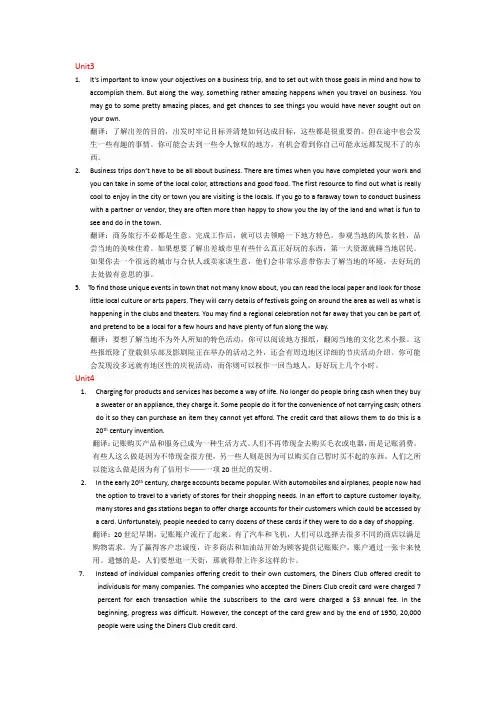
Unit31.It’s important to know your objectives on a business trip, and to set out with those goals in mind and how toaccomplish them. But along the way, something rather amazing happens when you travel on business. You may go to some pretty amazing places, and get chances to see things you would have never sought out on your own.翻译:了解出差的目的,出发时牢记目标并清楚如何达成目标,这些都是很重要的。
但在途中也会发生一些有趣的事情。
你可能会去到一些令人惊叹的地方,有机会看到你自己可能永远都发现不了的东西。
2.Business trips don’t have to be all about business. There are times when you have completed your work andyou can take in some of the local color, attractions and good food. The first resource to find out what is really cool to enjoy in the city or town you are visiting is the locals. If you go to a faraway town to conduct business with a partner or vendor, they are often more than happy to show you the lay of the land and what is fun to see and do in the town.翻译:商务旅行不必都是生意。

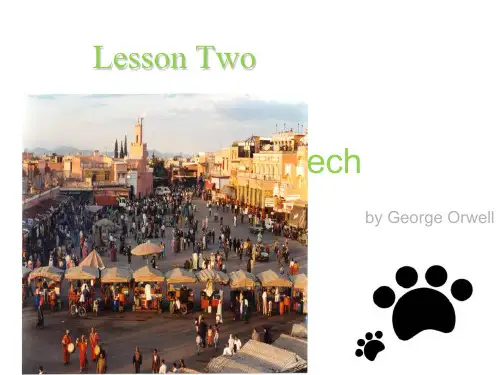


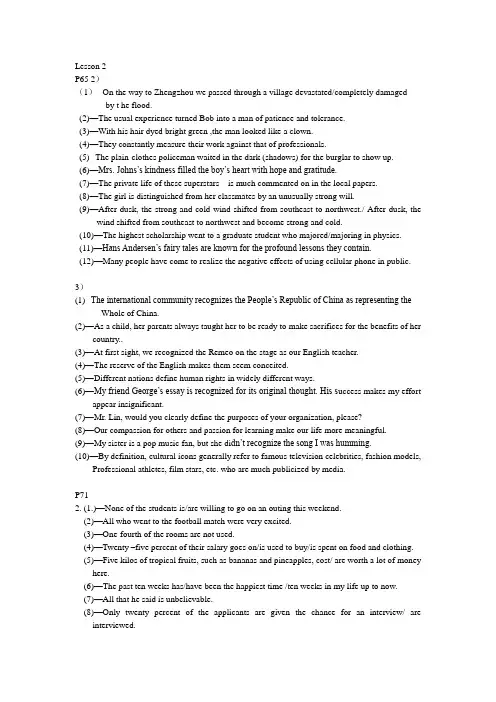
Lesson 2 P65 2) (1)--On the way to Zhengzhou we passed through a village devastated/completely damaged by t he flood. (2)—The usual experience turned Bob into a man of patience and tolerance. (3)—With his hair dyed bright green ,the man looked like a clown. (4)—They constantly measure their work against that of professionals. (5)--The plain-clothes policeman waited in the dark (shadows) for the burglar to show up. (6)—Mrs. Johns’s kindness filled the boy’s heart with hope and gratitude. (7)—The private life of these superstars is much commented on in the local papers. (8)—The girl is distinguished from her classmates by an unusually strong will. (9)—After dusk, the strong and cold wind shifted from southeast to northwest./ After dusk, the wind shifted from southeast to northwest and become strong and cold. (10)—The highest scholarship went to a graduate student who majored/majoring in physics. (11)—Hans Andersen’s fairy tales are known for the profound lessons they contain. (12)—Many people have come to realize the negative effects of using cellular phone in public.
高级英语上册课文逐句翻译Lesson One Rock Superstars关于我们和我们的社会,他们告诉了我们些什么?What Do They Tell Us About Ourselves and Our Society?摇滚乐是青少年叛逆的音乐。
——摇滚乐评论家约相?罗克韦尔Rock is the music of teenage rebellion.--- John Rockwell, rock music critic知其崇拜何人便可知其人。
——小说家罗伯特?佩恩?沃伦By a man’s heroes ye shall know him.--- Robert Penn Warren, novelist1972年6月的一天,芝加哥圆形剧场挤满了大汗淋漓、疯狂摇摆的人们。
It was mid-June, 1972, the Chicago Amphitheater was packed, sweltering, rocking.滚石摇滚乐队的迈克?贾格尔正在台上演唱“午夜漫步人”。
Mick Jagger of the Rolling Stones was singing “Midnight Rambler.”演唱结束时评论家唐?赫克曼在现场。
Critic Don Heckman was there when the song ended.他描述道:“贾格尔抓起一个半加仑的水罐沿舞台前沿边跑边把里面的水洒向前几排汗流浃背的听众。
听众们蜂拥般跟随着他跑,急切地希望能沾上几滴洗礼的圣水。
“Jagger,” he said, “grabs a half-gallon jug of water and runs along the front platform, sprinkling its contents over the first few rows of sweltering listeners. They surge to follow him, eager to be touched by a few baptismal drops”.1973年12月下旬的一天,约1.4万名歌迷在华盛顿市外的首都中心剧场尖叫着,乱哄哄地拥向台前。
“Hiroshima! Everybody off!” That must be what the man in the Japanese stationmaster's uniform shouted, as the fastest train in the world slipped to a stop in Hiroshima Station. I did not understand what he was saying. First of all, because he was shouting in Japanese. And secondly, because I had a lump in my throat and a lot of sad thoughts on my mind that had little to do with anything a Nippon railways official might say. The very act of stepping on this soil, in breathing this air of Hiroshima, was for me a far greater adventure than any trip or any reportorial assignment I'd previously taken. Was I not at the scene of the crime?The Japanese crowd did not appear to have the same preoccupations that I had. From the sidewalk outside the station, things seemed much the same as in other Japanese cities. Little girls and elderly ladies in kimonos rubbed shoulders with teenagers and women in western dress. Serious looking men spoke to one another as if they were oblivious of the crowds about them, and bobbed up and down re-heatedly in little bows, as they exchanged the ritual formula of gratitude and respect: "Tomo aligato gozayimas." Others were using little red telephones that hung on the facades of grocery stores and tobacco shops."Hi! Hi!" said the cab driver, whose door popped open at the very sight of a traveler. "Hi", or something that sounds very much like it, means "yes". "Can you take me to City Hall?" He grinned at me in the rear-view mirror and repeated "Hi!" "Hi! ’ We set off at top speed throug h the narrow streets of Hiroshima. The tall buildings of the martyred city flashed by as we lurched from side to side in response to the driver's sharp twists of the wheel.Just as I was beginning to find the ride long, the taxi screeched to a halt, and the driver got out and went over to a policeman to ask the way. As in Tokyo, taxi drivers in Hiroshima often know little of their city, but to avoid loss of face before foreigners, will not admit their ignorance, and will accept any destination without concern for how long it may take them to find it.At last this intermezzo came to an end, and I found myself in front of the gigantic City Hall. The usher bowed deeply and heaved a long, almost musical sigh, when I showed him the invitation which the mayor had sent me in response to my request for an interview. "That is not here, sir," he said in English. "The mayor expects you tonight for dinner with other foreigners or, the restaurant boat. See? This is where it is.” He sketched a little map for me on the back of my invitation.Thanks to his map, I was able to find a taxi driver who could take me straight to the canalembankment , where a sort of barge with a roof like one on a Japanese house was moored . The Japanese build their traditional houses on boats when land becomes too expensive. The rather arresting spectacle of little old Japan adrift adrift amid beige concrete skyscrapers is the very symbol of the incessant struggle between the kimono and the miniskirt.At the door to the restaurant, a stunning, porcelain-faced woman in traditional costume asked me to remove my shoes. This done, I entered one of the low-ceilinged rooms of the little floating house, treading cautiously on the soft matting and experiencing a twinge of embarrassment at the prospect of meeting the mayor of Hiroshima in my socks.He was a tall, thin man, sad-eyed and serious. Quite unexpectedly, the strange emotion which had overwhelmed me at the station returned, and I was again crushed by the thought that I now stood on the site of the first atomic bombardment, where thousands upon thousands of people had been slain in one second, where thousands upon thousands of others had lingered on to die in slow agony .The introductions were made. Most of the guests were Japanese, and it was difficult for me to ask them just why we were gathered here. The few Americans and Germans seemed just as inhibited as I was. "Gentlemen," said the mayor, "I am happy to welcome you to Hiroshima."Everyone bowed, including the Westerners. After three days in Japan, the spinal column becomes extraordinarily flexible."Gentlemen, it is a very great honor to have you her e in Hiroshima."There were fresh bows, and the faces grew more and more serious each time the name Hiroshima was repeated."Hiroshi ma, as you know, is a city familiar to everyone,” continued the mayor."Yes, yes, of course,” murmured the company, more and more agitated."Seldom has a city gained such world renown, and I am proud and happy to welcome you to Hiroshima, a town known throughout the world for its--- oysters".I was just about to make my little bow of assent, when the meaning of these last words sank in, jolting me out of my sad reverie ."Hiroshima –oysters? What about the bomb and the misery and humanity's most heinous crime?" While the mayor went on with his speech in praise of southern Japanese sea food, I cautiously backed away and headed toward the far side of the room, where a few men were talkingamong themselves and paying little attention to the mayor's speech. "You look puzzled," said a small Japanese man with very large eye-glasses."Well, I must confess that I did not expect a speech about oysters here. I thought that Hiroshima still felt the impact of the atomic impact .""No one talks about it any more, and no one wants to, especially, the people who were born here or who lived through it. "Do you feel the same way, too?""I was here, but I was not in the center of town. I tell you this because I am almost an old man. There are two different schools of thought in this city of oysters, one that would like to preserve traces of the bomb, and the other that would like to get rid of everything, even the monument that was erected at the point of impact. They would also like to demolish the atomic museum.""Why would they want to do that?""Because it hurts everybody, and because time marches on. That is why." The small Japanese man smiled, his eyes nearly closed behind their thick lenses. "If you write about this city, do not forget to say that it is the gayest city in Japan, even it many of the town's people still bear hidden wounds, and burns."Like any other, the hospital smelled of formaldehyde and ethere . Stretchers and wheelchairs lined the walls of endless corridors, and nurses walked by carrying Stretchers instruments, the very sight of which would send shivers down the spine of any healthy visitor. The so-called atomic section was located on the third floor. It consisted of 17 beds."I am a fisherman by trade. I have been here a very long time, more than twenty years, "said an old man in Japanese pajamas. “What is wrong with you?”"Something inside. I was in Hiroshima when it happened. I saw the fire ball. But I had no burns on my face or body. I ran all over the city looking for missing friends and relatives. I thought somehow I had been spared. But later my hair began to fall out, and my belly turned to water. I felt sick, and ever since then they have been testing and treating me. " The doctor at my side explained and commented upon the old man's story, "We still hare a handful of patients here who are being kept alive by constant car e. The other s died as a result of their injuries, or else committed suicide . ""Why did they commit suicide?""It is humiliating to survive in this city. If you bear any visible scars of atomic burns, your children will encounter prejudice on the par t of those who do not. No one will marry the daughter or the niece of an atomic bomb victim. People are afraid of genetic damage from the radiation." The old fisherman gazed at me politely and with interest.Hanging over the patient was a big ball made of bits of brightly colored paper, folded into the shape of tiny birds. "What's that?" I asked."Those are my lucky birds. Each day that I escape death, each day of suffering that helps to free me from earthly cares, I make a new little paper bird, and add it to the others. This way I look at them and congratulate myself of the good fortune that my illness has brought me. Because, thanks to it, I have the opportunity to improve my character."Once again, outside in the open air, I tore into little pieces a small notebook with questions that I'd prepared in advance for inter views with the patients of the atomic ward. Among them was the question: Do you really think that Hiroshima is the liveliest city in Japan? I never asked it. But I could read the answer in every eye.“广岛到了!大家请下车!”当世界上最快的高速列车减速驶进广岛车站并渐渐停稳时,那位身着日本火车站站长制服的男人口中喊出的一定是这样的话。